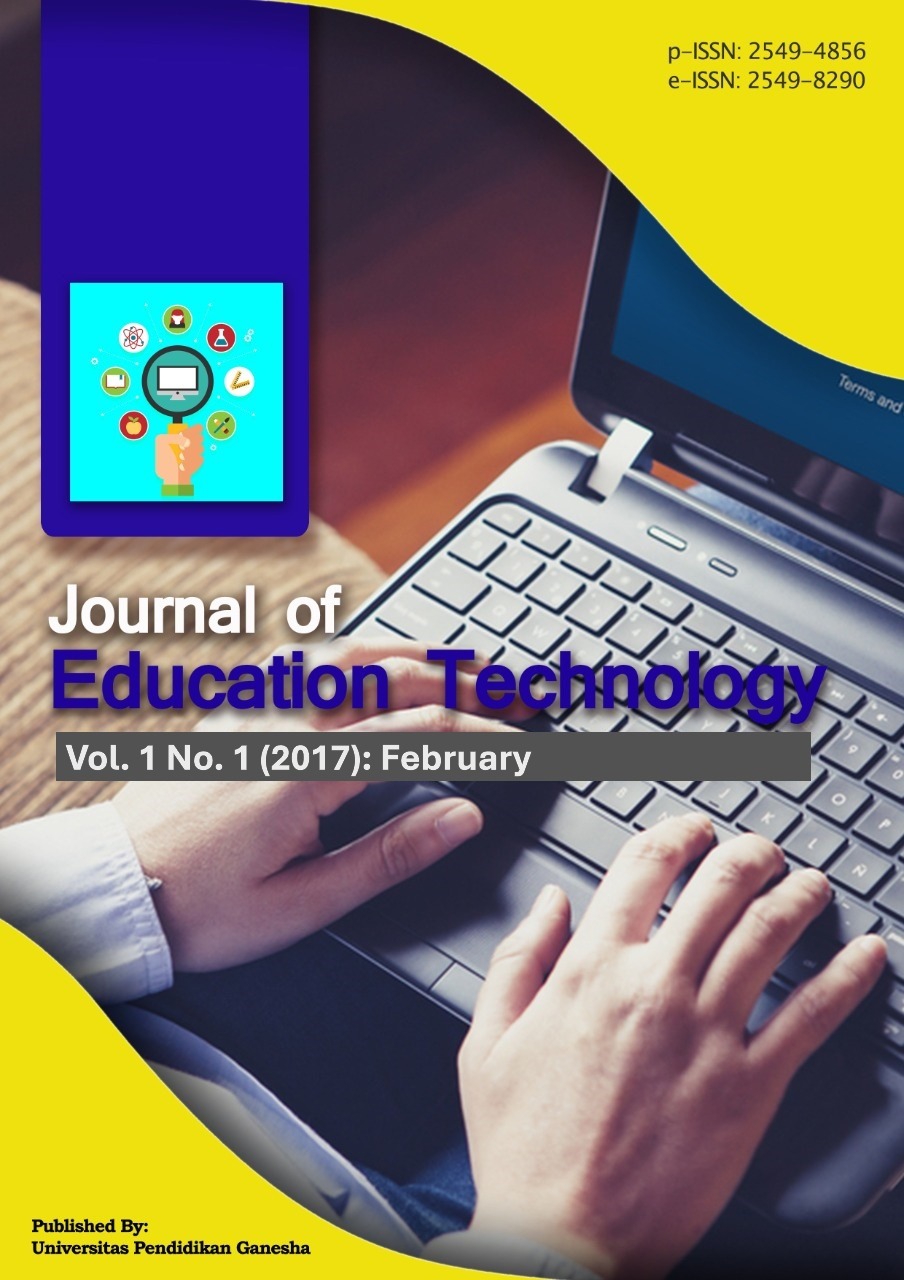AN EFFECT OF SOCIODRAMA METHOD IMPLEMENTATION IN STUDENTS LANGUAGE SKILL AT FOURTH GRADE ELEMENTARY SCHOOL IN CLUSTER XII OF BULELENG DISTRICT
DOI:
https://doi.org/10.23887/jet.v1i1.10083Keywords:
sociodrama method, language skill.Abstract
This study aimed at finding the effect of sociodrama method influence upon students’ skills of listening, speaking, reading, and writing. This study is a quasi-experiment which the data were analysed by using MANOVA. The samples were 75 students class IV of Public Elementary Schools in Cluster XII of Buleleng District. 37 students became the subject of experiment class and 38 students became the subjects in control class. The four data were collected by using language skill evaluation in form of written and performance test. The finding shows that: (1) There was a difference of listening skill between the students who followed the sociodrama method with students who followed conventional teaching method; (2) There was a difference of reading skill between the students who followed the sociodrama method with students who followed conventional teaching method; (3) There was a difference of writing skill between the students who followed the sociodrama method with students who followed conventional teaching method; (4) There was a difference of speaking skill between the students who followed the sociodrama method with students who followed conventional teaching method; (5) Simultaneously there was a difference of listening, reading, writing and speaking skills of the students who followed the sociodrama method with students who followed conventional teaching method.References
Agung, A.A. Gede. (2010). Metodologi Penelitian Pendidikan. Singaraja: Universitas Pendidikan Ganesha.
Candiasa, I Made. (2007). Statistik Multivariat Petunjuk Analisis dengan SPSS. Singaraja Program Pasca Sarjana Universitas Pendidikan Ganesha.
Djamarah & Zain. (2006). Strategi belajar mengajar. Jakarta: Rineka Cipta.
Hasan, Maimunah. 2009. Pendidikan anak usia dini. Jogjakarta: Diva Press.
Nazir. (2003). Metode Penelitian. Jakarta: Ghalia Indonesia.
Roger, Sue and Julie Evans. (2007). Inside Role-play in Early Chidhood education, Researching Young Children’s Perspektives. London and Newyork: Routledge.
Semi, Atar. (1993). Rancangan Pengajaran Bahasa dan Sastra Indonesia. Bandung : Angkasa.
Sugiyono. (2011). Statistika untuk Penelitian. Bandung: Alfabeta.
Suyatno. (2004). Metode Pembelajaran Bahasa Indonesia. Jakarta: Dirjen Dikdasmen.
Syamsudin dan Damaianti, Vismai S. 2007. Metode Penelitian Pendidikan Bahasa. Bandung: Rosda.
Tarigan, Henry Guntur. (2008). Membaca Sebagai Suatu Keterampilan Berbahasa. Bandung: Angkasa.
Tarigan, Jjago dkk. 2006. Pendidikan Bahasa dan Sastra di Kelas Rendah, Jakarta: UT
Wati, Undi Eka. (2016). Penggunaan Metode Sosiodrama dalam Peningkatan Pembelajaran Bahasa Indonesia bagi Siswa Kelas V SD. Dalam Jurnal Kalam Cendikia Volume 4, Nomor 2. Surakarta: Universitas Sebelas Maret.
WS. Winkel (1996). Psikologi Pendidikan dan Evaluasi Belajar. Jakarta: PT Gramedia
Zuhara, Evi. (2015). Efektivitas Teknik Sosiodrama untuk Meningkatkan Komunikasi Interpersonal Siswa. Jurnal Edukasi. Banda Aceh: UIN Ar-Raniry. ISSN 2460-4917
Downloads
Published
How to Cite
Issue
Section
License
Authors who publish with the Journal of Education Technology agree to the following terms:
- Authors retain copyright and grant the journal the right of first publication with the work simultaneously licensed under a Creative Commons Attribution License (CC BY-SA 4.0) that allows others to share the work with an acknowledgment of the work's authorship and initial publication in this journal.
- Authors are able to enter into separate, additional contractual arrangements for the non-exclusive distribution of the journal's published version of the work (e.g., post it to an institutional repository or publish it in a book), with an acknowledgment of its initial publication in this journal.
- Authors are permitted and encouraged to post their work online (e.g., in institutional repositories or on their website) prior to and during the submission process, as it can lead to productive exchanges, as well as earlier and greater citation of published work. (See The Effect of Open Access)
















